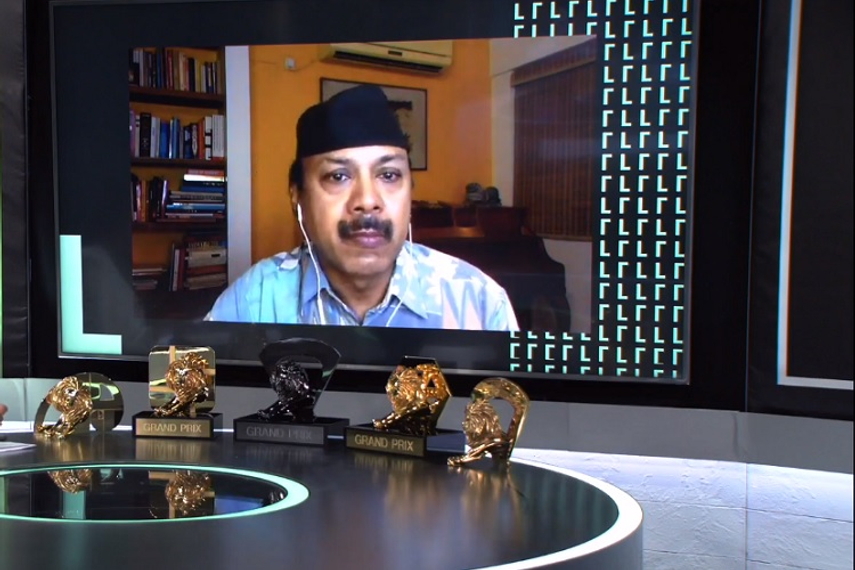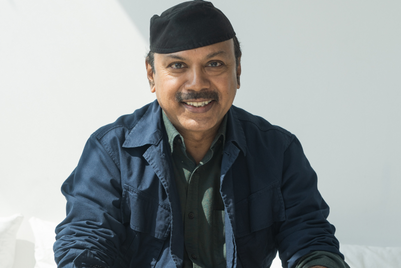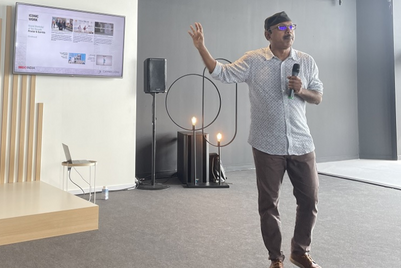Speaking during the first day on Lions Live, Josy Paul, chairman and chief creative officer, BBDO India, explained how he evolved to making clients buy his ideas rather than having to sell it to them.
It started with him nearly jumping out of a window while making his first presentation to a client.
"As a young trainee at Ogilvy I had to present my first piece of work to a large multinational client. Unfortunately no senior from the agency came for this presentation and I went with a young account executive. When we reached there we noticed the entire marketing department was there in front of us. I presented the idea and they looked at each other and they said no that's not what they expected. Something happened to me then and I ran to the window and threatened to jump out. I told the marketing department that they were responsible for this. Their rejection was the end of my career. Everyone was shocked. The marketing chief was very kind and told everyone to leave the room. It was only the both of us. He said to me in a kind voice, step down my son, I love your passion. Just step down and give me a chance and I'll get back to you. Something about his voice felt right and I left," said Paul.
Paul did end up getting his work approved, but his chief creative officer wasn't impressed.
"When I reached the agency the chief creative officer was waiting at the entrance. He held me by my ear and took me around the office as a punishment. The client had approved my work but didn't want to see me again. That was the first time I saw who I was. There was a need to survive. I realised I tried too hard to sell this work. When we created 'Touch the pickle', we didn't have to sell, the client bought it. Understanding the difference between selling and buying is a lifetime of learning and a lifetime of finding yourself," he added.
Paul also spoke about his experience of setting up Brand David which was later merged with Bates.
"In June 2000 I set up David along with Ogilvy and WPP. My partner Madhukar Sabnavis and I went to the Ogilvy board and said there was a need for a challenger agency in the country. We felt David Ogilvy had chosen the wrong end of his name. Ogilvy is a great name but David is an ideology. It was very exciting because we began to attract all kinds of interesting people. When you joined the agency, you had to resign from adulthood. You didn't get an appointment letter, you got a resignation letter. You had to accept the responsibilities of a six-year old. Our office was like a play school," he said.
One example that stood out for Paul from his time at the agency was when he and his partner took the help of people in the flight to arrive at a piece of work to present to a client.
"A large company asked us to pitch and there were a lot of large agencies pitching. We were a less significant agency and were on a flight from Mumbai to Delhi. We had about 30 pieces of work that the office had done over the weekend and I had hardly seen the work. The work was delivered to us at the airport. I looked at my partner and asked him for a PPT or whether he knew what to do. He thought I was handling it. We both realised we were carrying stuff we didn't know about it.So, we had an idea. I stood up and faced the passengers and asked for help. I said I'm from an ad agency and we're meeting a client and need to know what's good. So all these guys said they will help. I showed each piece of work down the aisle. The cabin crew helped too. People began to vote. From 30 pieces of work it came down to six. Then there was one more round of voting. It came down to one piece of work and people said we'd win. You realise the world is incredibly beautiful. The people in the flight had so much energy," he said.
What followed was a totally different experience.
Paul added, "The company that was hosting the pitch didn't even think we would come. Two days were over and someone told them we're still around. We walked to meet the MD and he told us not to sit. We were given five minutes to make our presentation. From the energy of the aircraft to now - we had become irrelevant. When people make you feel so small, something happens to you. In those five minutes what I told the MD something that impacted him so much that got rid of all his stress. That very second he looked at me and asked which agency was I from. I was stunned that no one had told him the name of my agency. We won the business and won all of the company's business. The agency that was handling it lost almost an entire flow of business. It was all because of the energy of the flight. I still don't know what happened and understand it but I can close my eyes and see every second of those two-three days."
A call from WPP to expand Brand David to the rest of Asia followed and Paul was called to Vietnam to make a presentation. Before heading to Vietnam he got permission to head to David Ogilvy's castle in France. He wanted to feel the energy and spirit from where David Ogilvy came. He wrote a letter and dug it into the soil where Ogilvy was buried. He took some soil from there and headed to Vietnam where he spoke about his experience at the castle. That's when he realised that one doesn't need to make a powerpoint but instead make a powerful point.
WPP then looked to merge David with Bates and Paul opposed that idea. He explained, "It felt like something was stolen from the original David. You were mixing two different things. I would wear T-shirts for soft protests. People would take pictures with me and I was the freak of the show where people secretly laughed at me. The protest didn't work and David would merge with Bates. Many of us quit and melted all our awards and created slabs of 'I am David'. I quit. I failed."
Paul then spoke about how failure, embarrassment and dejection helped him. They became his 'friends'. During his next job (as chief creative officer of JWT), Chris Thomas from BBDO sent him a book labelled from a secret friend. What followed was a meeting with Andrew Robertson and David Lubars. He met with the trio and was given the chance to set up BBDO in India.
The agency's famous 'creating acts not ads' philosophy was arrived upon on the first anniversary of the terrorist attacks in Mumbai. Rajdeepak Das and Paul
created the chant monument.
"Raj and I didn't sleep after the success of that initiative and we decided that the future of advertising is about creating acts not ads. We found ourselves once more and found meaning for why BBDO existed in India. We did one thing after another and got global recognition," he explained.




.jpg&h=334&w=500&q=100&v=20250320&c=1)
.jpg&h=334&w=500&q=100&v=20250320&c=1)
.jpg&h=334&w=500&q=100&v=20250320&c=1)




.png&h=334&w=500&q=100&v=20250320&c=1)





.jpg&h=268&w=401&q=100&v=20250320&c=1)


.png&h=268&w=401&q=100&v=20250320&c=1)
